Commentary on 2 Kings 15:30
Verse Context: 2 Kings 15:30 states, "And Hoshea the son of Elah made a conspiracy against Pekah the son of Remaliah, and smote him, and slew him, and reigned in his stead, in the twentieth year of Jotham the son of Uzziah." This verse narrates a pivotal event in the tumultuous history of Israel's kings, particularly during the period of the divided kingdom.
Historical Context
This passage occurs in the backdrop of a fragmented Israel, marked by instability and frequent changes in leadership. Israel's northern kingdom faced continuous external threats and internal strife, leading to conspiracies and assassinations. The rise of Hoshea as king after the murder of Pekah signals both a shift in power and the ongoing moral and spiritual decline of the nation.
Matthew Henry's Insights
Conspiracy Against Pekah: Matthew Henry emphasizes the treachery that characterized the rule in Israel. He notes that Hoshea’s rise through the assassination of Pekah illustrates the violent political climate.
- Pekah's Reign: Pekah ruled during a time of considerable strife; his downfall was not just a political maneuver but reflected the Divine judgment against Israel’s leadership.
- Judgment and Consequence: Henry points to the observation that, while kings may rise and fall by human hands, God’s sovereignty governs these events. The continued cycle of sin led to eventual national calamity.
Albert Barnes's Commentary
Albert Barnes elaborates on the character of Hoshea and the significance of this transition in leadership. He notes:
- Kingship of Hoshea: "Hoshea is regarded as the last king of Israel, indicating a terminal decline in the Northern Kingdom." His name itself evokes an image of salvation, contrasting sharply with the fate of Israel.
- The Role of Conspiracies: Barnes categorizes the political maneuverings as part of God's unfolding plan, warning that the nation's fate is directly tied to their fidelity to God.
Adam Clarke's Perspective
Adam Clarke offers a critical analysis of the naming in this text. He posits:
- Hostile Environment: Clarke frames Hoshea’s actions within the context of ruthless ambition prevalent in Israel. The text illustrates a contrast between the delicate nature of leadership and the harsh realities of maintaining power.
- Theological Implications: He also posits that this cycle of violence indicates God’s patience reaching an end, beckoning a final reckoning for the covenant people who had repeatedly sinned.
Theological Reflections
Scholars often grapple with the theological implications of such violent transitions in leadership. The act of assassination, while politically significant, serves a dual purpose in the narrative:
- Divine Sovereignty: The sovereignty of God looms over human actions, demonstrating how even the darkest of human endeavors falls within His providential plan.
- Nation's Moral Decay: The prominence of conspiracies in leadership points to a deeper moral decay among the people of Israel. The assassination of a king, a divinely appointed leader, symbolizes their rebellion against God.
Pastoral Application
This passage raises profound questions for pastoral reflection and application:
- The Nature of Leadership: It serves as a reminder that leaders should be held to a higher standard, reflecting the character of God. The consequences of moral failure in leadership can be catastrophic, not just personally but for entire communities.
- Trust in God's Plan: For believers today, this narrative beckons reflection on the importance of trusting God's overarching plan amid chaos. It invites pastors and congregants alike to maintain faith amidst troubling leadership scenarios.
Conclusion
In conclusion, 2 Kings 15:30 encapsulates the complexities of kingship during a tumultuous period in Israel's history. It is a somber reminder of the rebellion against God by His people and the harsh reality that often accompanies human governance. As we study this passage, we are called to examine our own loyalties and the integrity of our leaders while holding firm to the hope found in God's sovereignty and justice.


